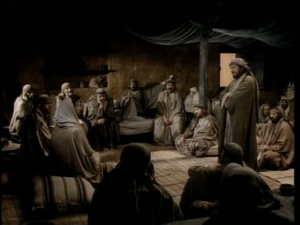[Greek] δογματίζω (dogmatizō), [Latin] decernere: to speak dogmatically, to decree, to subject oneself to an ordinance, to submit, to command, to put one under an obligation; Col.2:20

The Jerusalem Council sorting out the issues of circumcision and dietary laws
Background Information:
Greco-Roman culture: The basic meaning of this word is what seems to be right. In philosophical circles, this term can mean opinion, principle, or doctrine. In political circles, this term can mean what is resolved, resolution of an individual or assembly, edict, or decree. It is hardly surprising that decrees often intersect with philosophical principles.
Old Testament: The Torah became a system involving both decrees and teaching. The Torah contains dogmas and other related sacred principles of divine philosophy. Judaism is faith mixed with commandments, regulations, decrees, and rituals. The Hebrews have historically lived in a culture governed by kings. Hebrews were accustomed to being subjected to decrees and edicts of kings. Likewise, decrees often intersect with teachings.
New Testament: The Christians often continued to be subject to the authority of the Jewish leaders and Roman authority. The act of submitting a regulation is given a special emphasis in Colossians. However, a new paradigm shift of authority occurs with the appearance of Jesus. Christ brings an end to the Mosaic Law. Christ speaks of putting aside the older religious ways (dogmas) in order to find salvation.
Scripture:
“If you died with Christ to the elemental powers of the world, why do you submit to regulations as if you were still living in the world?” Col.2:20
Paul was warning the Colossians to avoid the existing pagan rituals involving food, drink, and the principalities (heavenly beings). Paul was warning them to do away with these humanly imposed pagan practices and follow Christ’s ways.
Early Christianity: Like the Hebrews, the Christians incorporated their faith into sacred beliefs and principles. Unlike the Hebrews, the Christians did not have a written faith source document. The Christians had to rely on oral Tradition to teach and spread the Christian faith. In response to cultural issues between Jews and Gentiles, the Jerusalem council ruled that the Gentiles were not required to undergo circumcision. The Jerusalem council also ruled that Gentiles must avoid foods offered to idol sacrifices.
Didache: The Didache or Teaching of the Twelve Apostles was written before 150 A.D. Although not considered a canonical work, the Didache provides an insightful picture of the practices of the early Christian community. Didache 11,3 states “in regard to the apostles and prophets, act according to the doctrine of the gospel.” The Didache is essentially an instruction manual for the early Christians.
St. Ignatius’ Letter to the Magnesians (written 100 A.D.)
“Take care, therefore, to be confirmed in the decrees of the Lord and the Apostles….Be subject to the bishop and to one another, as Jesus Christ was subject to the Father, and the Apostles were subject to Christ and to the Father.”

The Nicaea Council sorting out the issues of Jesus’ nature
Council of Nicaea: This council was convened by the emperor Constantine in 325 A.D. in order to respond to the Arian belief (heresy) that Jesus, as the Son of God, was a created being. The council proclaimed that Jesus was begotten, not made. Jesus was of the same substance of the Father. This leads to the development of the Trinity, the three Persons of God.
Conclusion:
Dogma, dogmatic, discern
It seems that in order for governments and religions/faiths to be effective, they must have principles, rules and regulations. Otherwise, there would be resistance and chaos. It was only natural that Christianity developed core beliefs and principals, despite not having an original written theological manual. The only written scriptures at the time (of the Apostles) was the Old Testament.
Over history, there have been times when false teachings or heresies occurred. Sometimes, church leaders had to further define and clarify their basic teachings as a means to counter these false teachings. In addition, church leaders often implored their followers to follow the teachings of Jesus and the Apostles. So dogma can be considered the “meat and potatoes” or important principles of the faith.
